Selfie mania has taken the world by storm, and in our travels we are no exception.

Mark gets a selfie with a bear. Wow!
And selfie sticks are all the rage at every scenic overlook we go to.

The gear of choice in the National Parks is the selfie stick!
But there is a better way to hold a camera still, especially a big DSLR: a good quality tripod and ball head!
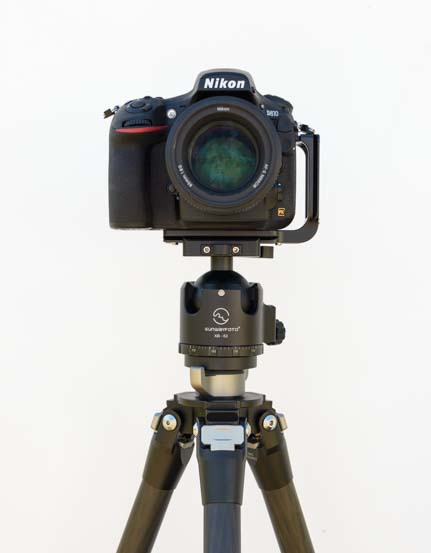
Sunwayfoto T2C40C Tripod and XB-52 Ballhead
Photography has become a major part of our lives and travels, and as our skills have improved, we have upgraded our camera equipment as well. In the following link we outline all of the gear we use, from cameras and lenses to accessories like flashes and tripods to software for post-processing (as well as explaining how we organize our photos), and we also provide links to all the resources we’ve used to learn how to take photos:
Photography Gear, Tips and Resources
Tripods – Cheap vs. Expensive
It is said that as a photographer improves, his or her biggest equipment concern goes from getting the right camera body to buying the most appropriate lenses to finding the best tripod. We are working our way along this progression, and soon after Mark purchased his Nikon D810 camera a few months ago, he began casting about to find a suitable tripod for it.
Mark’s old tripod / ball head combo was too flimsy to support the D810 properly, and it wasn’t all that easy to use. He decided on the Sunwayfoto XB-52DL “Low Profile” Ball Head sitting on the Sunwayfoto T2C40C tripod legs with an optional DDC-60LR Quick Release Clamp.
Because we have a lot of readers who are seeking to improve their photography as they travel, just like we are, we wanted to share our experiences with this new tripod kit.

Sunwayfoto DDC-60LR Quick Release Clamp atop an XB-52 Ballhead
all sitting on a Sunwayfoto T2C40C Tripod
When we first became interested in photography, we couldn’t understand why tripods could be as cheap as $29 or as much as $1,500. But we have learned since then that the price/performance trade-off is very simple, and it all boils down to three things:
- Sturdiness
- Overall weight
- Ease of use
Cheap tripods take precious time to set up, can be difficult to position the camera correctly to get the image you want, don’t necessarily hold the camera perfectly still (and sometimes even let it droop a little after you’ve got everything in place), and are often too short to put the camera at eye level. Expensive tripods do all those things with ease, and they are lightweight enough to carry comfortably.
When is a tripod handy to use? Whenever the shutter speed is so slow that hand-holding the camera will make the whole image blurry because your hand moves while taking the photo.
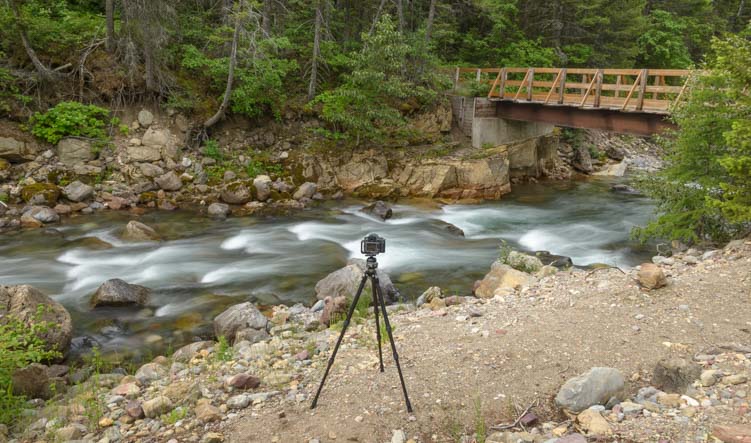
With a tripod, flowing water can be made to look silky smooth.
We use ours all the time for low light photography (sunrise and sunset), for night photography (shooting starry nights and the Milky Way), for long shutter speeds to reveal movement, like the flow of waterfalls, and for time-lapse sequences that show movement in a video format, like fast moving clouds and changing light.

The Sunwayfoto XB-52DL ball head is rated to support a whopping 132 lbs., far more than other comparable tripod ball heads.
Like most budding photographers, we’ve frittered away lots of good money on cheap tripods as we’ve learned these lessons. After all, when you’ve broken the bank buying a camera and lenses, who wants to dig deeper in their pockets to get a decent tripod?
As is his way, Mark did an exhaustive search with a few criteria in mind for what he wanted in his new tripod. It had to be:
- Stable enough to hold the camera with our longest lens, which is a Tamron 150-600mm
- The ball head had to be strong enough that the camera wouldn’t droop after it was tightened
- The tripod legs had to be carbon fiber (i.e., strong and lightweight)
- He didn’t want it to spend all our savings on it

An excellent value.
In the end he settled on the Sunwayfoto T2C40C Tripod with the Sunwayfoto XB-52DL “Low Profile” Ball Head. This is a Chinese brand that is not particularly well known in the US yet, and is competing against the much more expensive brands like Gitzo.
Sunwayfoto – Quality Camera Gear at a Good Price
Mark began looking into the Sunwayfoto brand because we both used their L-Brackets on our Nikon D610 cameras and Mark now uses the Sunwafoto PNL-D810R L-Bracket on his new Nikon D810. We liked the craftsmanship of our L-brackets, and when we discovered Sunwayfoto makes tripods and ball heads, their tripod kits seemed worthy of a closer look.
Side note: an L-Bracket is a handy piece of gear that mounts on the camera so the camera can be slipped onto the tripod easily. Because the bracket is an L-shape, the camera can be switched from a landscape orientation to a portrait orientation quickly and easily.

The Sunwafoto PNL-D810R L-bracket mounts on the camera to simplify the use of a tripod.
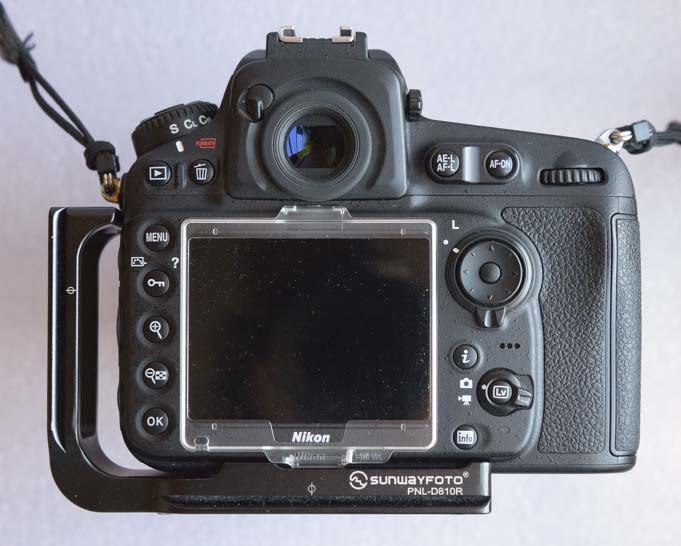
Nikon D810 camera with Sunwafoto L-bracket attached.
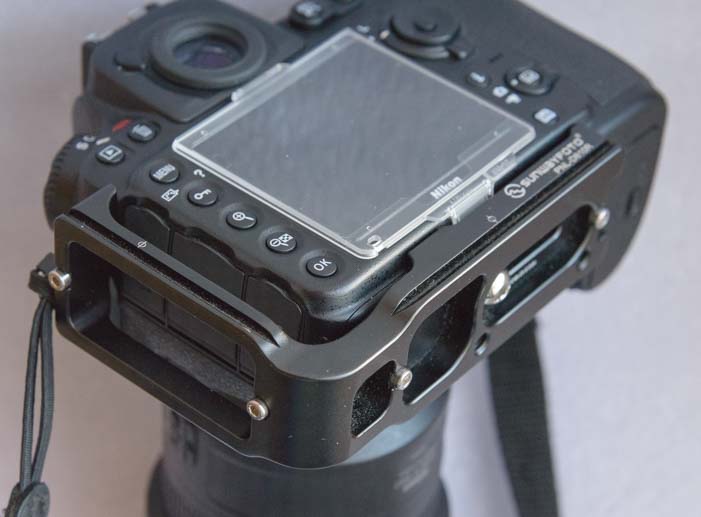
The L-bracket gets screwed into the bottom of the camera.
What’s neat about the Sunwayfoto L-brackets is that they fit the camera body perfectly, even when the plastic cover protecting the camera’s LCD display is in place. L-brackets made by other manufacturers don’t always fit properly when the plastic LCD protector is on. The Sunwayfoto L-brackets also provide lots of room to plug optional cables (like an external microphone) into the left side of the camera.
Sunwayfoto XB-52 “Low Profile” Ball Head
Getting a good, solid and easy to use ball head was the most important criteria for Mark’s new tripod. The Sunwayfoto XB-52DL “Low Profile” Ball Head is the biggest of Sunwayfoto’s ball head offerings, and it is truly unbelievable in craftsmanship and strength. It is beautifully machined and anodized from a solid piece of aluminum. It also has a geared locking mechanism that claims a Max Load of 132 lbs (60 kg)! That is 82 more pounds than top-of-the-line Really Right Stuff’s largest ball head.
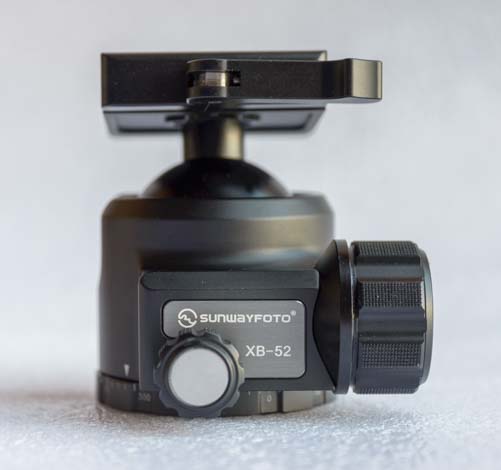
Sunwayfot XB-52DL Ballhead
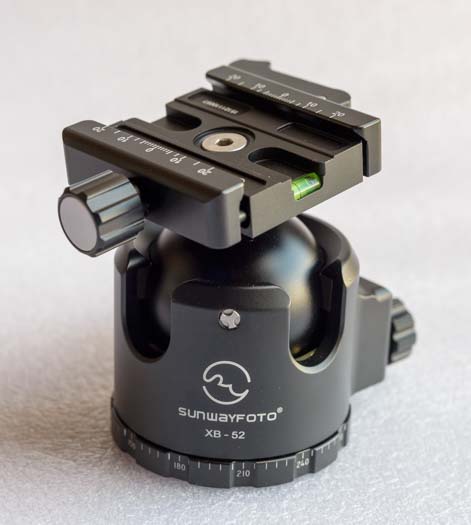
Sunwayfoto XB-52DL ballhead
When locked down, the camera does not budge on this ball head. Even when carrying the tripod on his shoulder, Mark has found the camera doesn’t droop like it did with his old tripod setup.
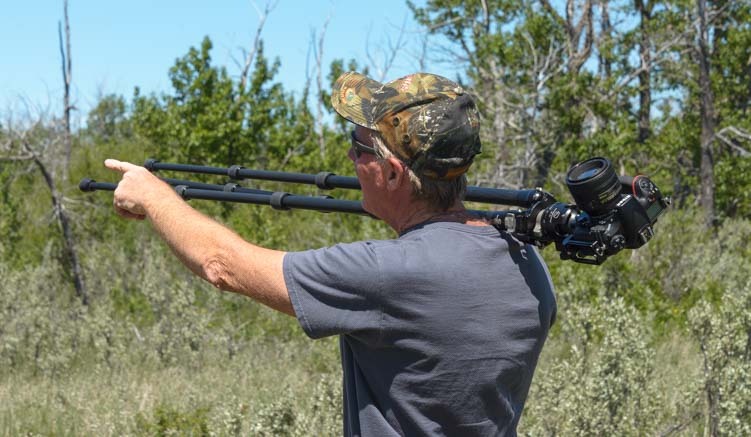
The ballhead holds the camera securely when walking around with the tripod on your shoulder.
The large locking knob on this ball head is made from solid metal and has an excellent feel to it. There is no rubber to wear out or come loose.

There are two adjustment knobs for the ball,
a large outer knob and a smaller inner dial.
There are two knobs for adjusting the position of the camera, a larger knob for gross adjustments and a fine tuning dial within that knob that lets you set precisely how easily (loosely) the camera swivels on the ball head.

The smaller knob fine-tunes how easily the camera flops around on the ball when it is loose. The larger one tightens it down.
There are also two notches on the ball head body to allow the camera either to be dropped extra far forward (for images aimed towards the ground) or to be tilted sideways (for portrait oriented images).

There are two notches that allow the camera to be dropped down, rather than just a single one like many ball heads.

The notches in the ballhead allow the camera to be faced down.
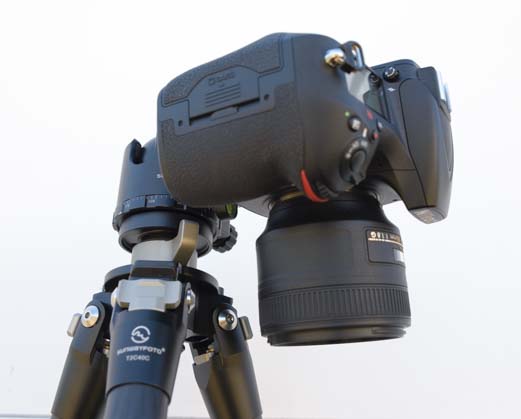
.
The notches for setting up a portrait orientation are handy if you don’t want to use an L-bracket.

The notches allow the camera to be flopped on its side for a portrait shot.
We prefer using an L-bracket and not using the ball head notches for portrait shots because of the inherent stability of placing the camera on the top of the tripod for portrait orientations instead of having it hang off the side.
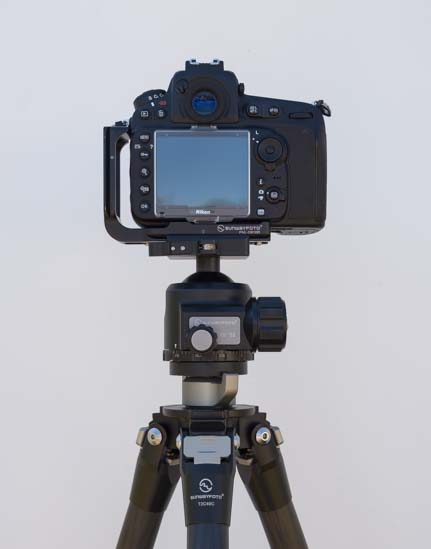
Using an L-bracket gives the option of either a
landscape orientation…
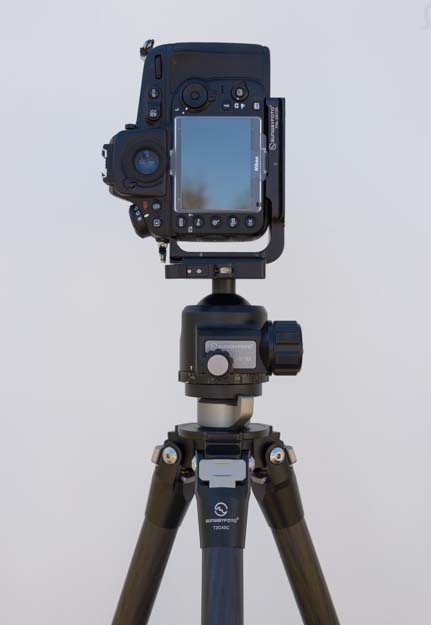
…or portrait orientation
Here the camera is on top of the tripod and not flopped to the side in one of the notches, a more balanced and secure setup.
For the weight conscious, the Sunwayfoto XB-44 ball head is slightly smaller and lighter than the XB-52 but can still support a whopping 88 lbs. It weighs just 483 grams as compared to the 685 grams of the bigger ballhead, a difference of over 7 ounces (nearly half a pound), which some folks would find makes a difference on a long hike.
“Quick Release” or “Lever Release” Clamps
One of the best things about the XB-52DL “Low Profile” Ball Head is the fast action of the quick release. Simply flip the quick release lever open and slip the camera into the Arca Swiss compatible slot and then close the lever, and you are ready to go.
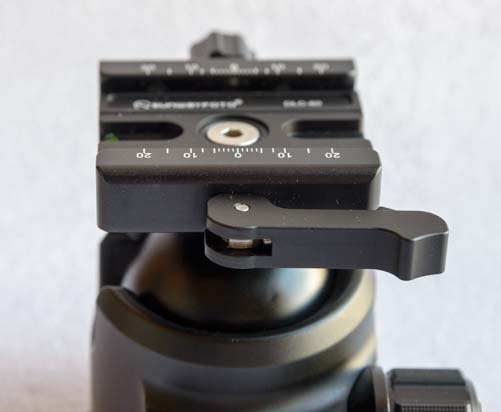
The Sunwayfoto quick release clamp makes it super easy to lock the camera in position.
Note that the Sunwayfoto XB-52 ball head without the “DL” suffix does not have a quick release clamp.
I was so impressed by Mark’s new tripod ball head, and especially the quick release mechanism, that I got one too. It replaced the Benro V2 ball head that had come with my Benro Travel Angel II tripod. The Benro ball head had a knob that had to be unscrewed and screwed back in each time the camera was mounted or dismounted on the tripod, something that got to be a real pain when I wanted to switch between portrait and landscape orientations quickly. It is also not nearly as finely crafted.
Like Mark, I absolutely LOVE the XB-52DL ball head. Even though it is almost 13 ounces heavier than my old Benro ball head, I find it is fast and easy and precise and worth the few extra ounces of carrying weight on a long hike. My tripod can still be strapped onto my Camelback H.A.W.G. hydration pack for those long days of hiking where I want 100 ounces of water along with a second lens, assorted filters, spare battery and SD cards.

The ultlra strong Sunwayfoto XB-52DL ball head fits comfortably on my Benro tripod legs and can be carried easily with my Camelbak H.A.W.G. hydration pack.
The quick release clamp locking lever has three positions: Open (right), Center, and Closed (left). There is a slide-lock on the lever so you can’t accidentally bump it and risk having your camera fall off the tripod.
The knob opposite the quick release clamp is used to fine-tune the tension, or grip, on the clamp holding the camera’s L-bracket in place. This is an important knob if you have more than one camera body and L-bracket (or other Arca Swiss style plate), because the widths vary ever so slightly.

In the “open” position, the camera slips onto the plate.
The knob (top) adjusts the grip on the camera’s L-bracket or plate
When the lever is in the Center position, the locking mechanism is half open and allows the camera to slide from left to right within the range of the stops on the L-Bracket, but is still secure so the camera won’t slide out and fall to the ground.

In the “center” position the camera can be slid from side to side on the plate without falling off.
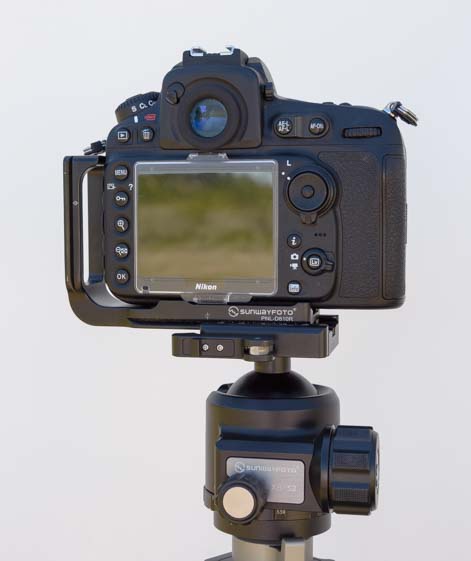
The camera can be slid about an inch to the left and right while everything else remains in place on the tripod.
When the lever is opened all the way, the camera can be removed for handheld shooting or for switching to the other orientation (portrait or landscape) quickly.
Sunwayfoto DDC-60LR Quick Release Clamp
Mark likes to do panorama shots, so he opted to replace the quick release clamp (or “Lever Release”) plate that comes with the XB-52DL ball head with the DDC-60LR Quick Release Clamp instead, because it has a bubble level that indicates whether the series of shots are going to be level with the horizon or are going so go sailing off on some kind of crazy diagonal, ruining the final, stitched image.
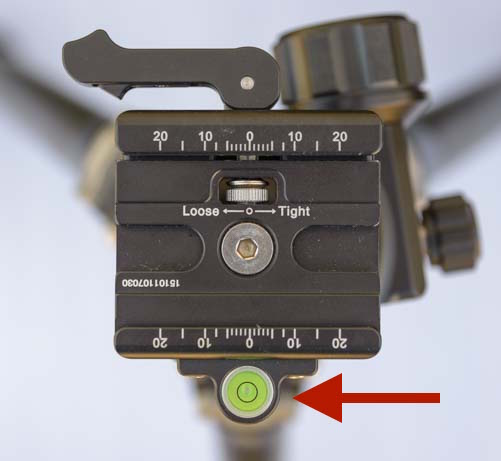
The optional DDC-60LR lever release has a bubble level which helps with stitching multiple images into one panorama shot.
This is another finely made product that not only makes mounting the camera on the tripod a snap and makes switching from landscape to portrait (with an L-bracket) an absolute breeze, but provides a mechanism for leveling as well.
The primary difference between this quick release clamp and the one that comes with the XB-52DL ball head is that the knob opposite the quick release clamp that is used to adjust the grip tension on the camera’s L-bracket (or other Arca Swiss style plate) is no longer there. It has been replaced by the bubble level. In the absence of this knob, there is a small dial on the plate for adjusting the grip tension instead.

The fine tuning grip tension knob is now a dial on the plate itself.
There is a spring that sits against the dial to hold it in place once you set it to your liking. Mark found the spring was a bit loose and the dial would turn a little on its own until he put a drop of Blue Loctite on the threads. In hindsight, he’s found that this has made it difficult to adjust the tension.
Another subtle difference between the Sunwayfoto DDC-60LR Quick Lever Release Clamp and the one that comes with the XB-52DL ball head is that the open/closed positions of the quick release lever can be reversed (for left handed people). Simply place the lever in the center position, pull it out slightly, and rotate it. Then the open and closed positions will be in the opposite directions (left to open and right to close).
Our overall impression is that the quick release clamp that comes with the Sunwayfoto XB-52DL Ball Head is easier to work with than the DDC-60LR Quick Release Clamp because the grip tension adjustment is done with a knob rather than a tiny dial. However, it also has a minor limitation, for those who want to stitch together lots of images for panoramas, that it doesn’t have a bubble level.
Sunwayfoto T2C40C Tripod
The tripod legs Mark chose are the Sunwayfoto T2C40C tripod legs. This tripod is a thing of beauty, with 8 layers of woven carbon fiber and a one piece CNC machined main structure.

The Sunwayfoto T2C40C tripod has carbon fiber legs.
The leg joints on this tripod have longer (40mm) friction tubes in them than are found on most comparable tripods, which makes a sturdier connection between the leg joints when they are extended. The tripod is rated at a max load of 12KG or 26.5 lbs. which isn’t the beefiest tripod out there, but the legs seem solid enough for the Nikon D810 and big Tamron 150-600 lens.

The legs extend and retract by rotating a knob at each joint.
The only drawback is that the tripod is only 52.5” tall (without the center column extended). Once the XB-52 ball head is attached, it stands 56” high, which is a few inches taller than Mark’s older tripod setup and is almost at eye level for him (he would love for it to be just a few inches taller!).
Another improvement would be to have some foam on at least one of the legs for carrying in cold weather, although foam might start to deteriorate over time, and this tripod looks like it will last a long time.

The tripod is just about at eye level for Mark, but not quite.
The Sunwayfoto T2C40C tripod also has a very innovative (patented) leg pivot mechanism. Instead of the typical hex head screw attachment to connect the legs, there is a connector which has a special anti-twisting boss design on one screw head while the other side screws into it with a torx type connecting screw (the Torx wrench is included with the tripod). This prevents the screws from twisting and loosening up inside the leg attachment as the legs are pivoted and moved back and forth to set up. Most Tripods legs need to be tightened frequently with two hex style wrenches.
Mark found that after using this tripod for about a month he actually needed to tighten those screws a bit. He removed the screws and put a drop of Blue Loctite on the threads which helped.
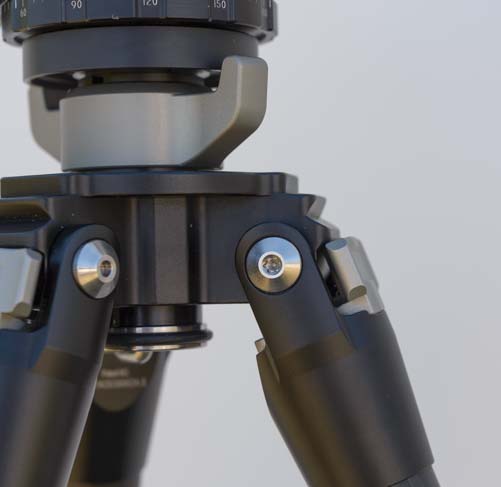
There are torx screws to keep the leg joints at the top stiff.
One neat feature of the Sunwayfoto T2C40C tripod is that the rubber feet on the bottoms of the legs can be unscrewed and removed to expose corrosion resistant Titanium spikes. These spikes plant the tripod firmly in loose conditions. Some of the other hardware used in this tripod is also made of Titanium, which very impressive indeed!

The rubber feet at the bottom of the tripod legs can be unscrewed.
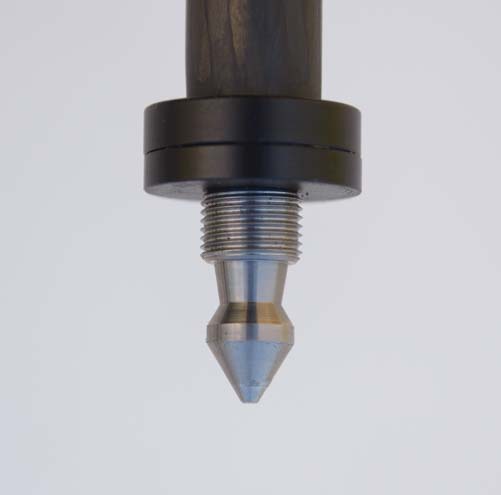
Underneath the rubber protection booties, the tripod has titanium points for gripping loose soil.
The center column of the tripod can be removed and replaced with the included short column so you can splay the legs out all the way out for close-to-the-ground macro photography.

The center column is removable to allow for close-up photography
that is low to the ground.
The Sunwayfoto T2C40C tripod also comes with a spring hook that can be put on the bottom of either the long or short center column tube to help weight it down in windy conditions. Mark likes to hang his gear bag on it to keep his pack off of the ground and help steady the tripod.

You can hang your gear bag on the center hook to weight the tripod down.
The Sunwayfoto T2C40C tripod comes packed in a high quality padded carry bag that has carry straps that can be attached to it for hiking. The kit even includes a nice lens cleaning cloth (a cleaning cloth is also provided with the Sunwayfoto XB ball heads).

The Sunwayfoto T2C40C tripod comes with a good quality
padded carrying case.

The tripod carrying case has both a shoulder strap and a carrying handle as well as several pockets for small items like spare memory cards and battery.
Sunwayfoto is continuing to perfect their design of this tripod. When it was first introduced, it had only one anti-twist slot or groove in each of the legs, which made it prone to rotating and breaking. This resulted in some unfavorable online reviews of the tripod. The design has been upgraded and now has 2 slots in each leg.
If you are in the market for a quality tripod kit, the Sunwayfoto ball heads, quick release clamps, L-brackets and tripod legs are a good bang for the buck. All of these are mix-and-match, so if you already have tripod legs you like, as I did, you can simply upgrade the ball head and/or the quick release clamp. Or, go all out like Mark did, and get the whole darn kit!

.
Happy shooting!!
Subscribe
Never miss a post — it’s free!
Here is a little more manufacturer info about these products and links to buy them:
- Sunwayfoto XB-52DL Ball Head with Quick Release Clamp and Where to Buy
- Sunwayfoto T2C40C Carbon Fiber Tripod and Where to Buy
- Sunwayfoto DDC-60LR Quick Release Clamp with Bubble Level and Where to Buy
- Sunwayfoto L-Brackets and Where to Buy
Here is all the camera gear we use and resources we’ve relied on to learn photography:
Our most recent posts:
- How to Install Starlink Gen 3 in an RV? Use the Speedmount! 08/07/25
- Escape to Paradise – Rocky Mountain Magic! 08/01/25
- Is Forest River a Good RV? Well Built? Here’s Our Experience 06/20/25
- Sunset Crater Nat’l Monument – Lava & Camels at Bonito CG! 06/06/25
- 2024 Alpha Wolf 17CB Trailer – Our Goldilocks RV! 04/25/25
More of our Latest Posts are in the MENU above.

Great review and the bear selfie is a classic!
Thanks!! That was one wild and ferocious bear!!!
I really enjoy your site and follow you two daily. Looks like an excellent tripod and head system, thanks for the review. I would also add one more item—a “Sidekick” attachment for the ball head. It will give you the most stable possible setup for your longer Tamron 150-600 lens. The Sidekick is an accessory that attaches to your ball head to make it like a Wimberley head–fantastic!! Thanks again.
Thanks, Dan! I think you are referring to this piece of gear. That sure would be handy! Thanks for following our travels.
Yes, that is it. I’ve been using one for many years on lenses as large as a 400mm/f2.8 lens with great results. Thanks again for the great site, I’ll continue to follow your adventures and read your reviews regularly. If you ever explore Alaska on your RV drop me an email—I’ve lived in Alaska for 36 years now and it is truly a photographer’s paradise.
Thanks very much! We hope to get to Alaska at some point and would love to have an insider’s view. Happy shooting in the midnight sun!